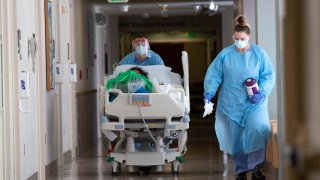
Worried that a new COVID-19 wave could overwhelm understaffed U.S. hospitals, federal officials on Thursday loosened rules that call on health care workers to stay out of work for 10 days if they test positive.
Those workers now will be allowed to come back to work after seven days if they test negative and don't have symptoms. Isolation time can be cut to five days, or even fewer, if there are severe staffing shortages, according to the new Centers for Disease Control and Prevention guidance.
WATCH ANYTIME FOR FREE
Stream NBC10 Boston news for free, 24/7, wherever you are. |
“As the health care community prepares for an anticipated surge in patients due to omicron, CDC is updating our recommendations to reflect what we know about infection and exposure in the context of vaccination and booster doses," CDC Director Rochelle Walensky said in a statement.
"Our goal is to keep health care personnel and patients safe, and to address and prevent undue burden on our healthcare facilities," she added.
Get updates on what's happening in Boston to your inbox. Sign up for our News Headlines newsletter.
Isolation is designed to keep infected people away from uninfected people, to prevent further spread of the virus.
CDC officials have advised that in calculating the 10-day isolation period, the first day should be the first full day after symptoms first developed or after a positive test. If a person develops symptoms sometime after a positive COVID-19 test, the quarantine period must restart, beginning one day after the symptoms develop.
___
The Associated Press Health & Science Department receives support from the Howard Hughes Medical Institute’s Department of Science Education. The AP is solely responsible for all content.

